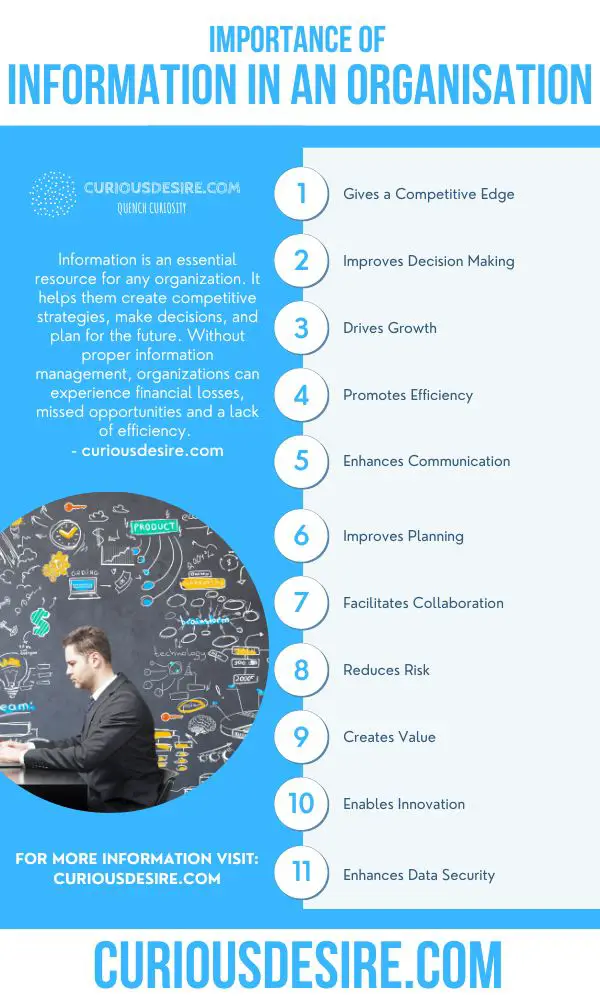Information is an essential resource for any organization. It helps them create competitive strategies, make decisions, and plan for the future. Without proper information management, organizations can experience financial losses, missed opportunities and a lack of efficiency.
If you’re thinking of starting a business or you want to increase the performance of your existing organization, here are 15 reasons for the importance of information in an organisation.
16 Benefits of Information in an Organisation
Information is a powerful tool that helps organizations make profitable decisions. Here are some of the ways it can benefit your organization.
1. Information in Organisation Gives a Competitive Edge
With the right data at hand, your organisation can acquire a competitive advantage over its rivals. It allows you to stay ahead of trends and make better decisions, which can lead to improved performance and profitability.
Through data analysis, you can also recognize opportunities that your rivals have missed. By taking advantage of these opportunities and making the right decisions, you can ensure that your organisation performs better than its competitors.

2. Information Improves Decision Making
Organisations have access to vast amounts of data that they can use to make informed decisions. By analyzing large volumes of data, managers can uncover trends and patterns that would otherwise be difficult to observe.
By taking into account these trends, managers can make better decisions that will lead to improved performance and profitability. With accurate data, they can also anticipate customer needs and develop strategies accordingly.
3. Information Drives Growth
Growth is an important part of any organisation’s success. Data helps organizations identify new markets and opportunities for expansion. By collecting and analyzing data, organizations can identify new ways to increase their customer base, improve their products and services, and develop better strategies for success.
In addition, organisations can use data to develop new products and services that will further their growth. By leveraging data, organizations can gain a better understanding of their customers and the markets they operate in. This enables them to create products and services that are tailored to meet customer needs, which helps drive growth.
4. Information Promotes Efficiency
By collecting and analyzing data, organisations can improve their operational efficiency. Data analysis can help identify areas where processes are inefficient and need to be improved.
With accurate data, managers can develop strategies for optimizing operations, which can lead to cost savings and improved productivity. Through data analysis, organizations can also identify potential problems and take steps to address them before they become costly. In this way, data can help ensure that operations run more smoothly and effectively.
Suggested Readings
Why Information is Important in our daily Life
Importance of information in life
Importance of information essay
5. Information Enhances Communication
Information can be used to improve internal communication among different departments of an organisation. By giving all stakeholders access to the same data, communication is improved, which helps ensure that everyone is on the same page when it comes to decision-making and strategy development.
Additionally, data can be used to facilitate communication between an organisation and its customers. By collecting customer feedback and analyzing it, organizations can better understand their needs and develop strategies for meeting them. This helps improve customer relations and increases the likelihood of long-term success.
6. Information Improves Planning
Information can be used to inform the planning process of an organisation. By collecting and analyzing data, organizations can develop better strategies for success. They can also identify opportunities that they may have missed, allowing them to make more informed decisions and plan accordingly.
Through data analysis, organisations can also understand the market and its trends better. This helps them develop plans for responding to changes in the market and seize new opportunities when they arise. In this way, data can help ensure that an organization’s planning process is informed and effective.

7. Information Facilitates Collaboration
Information can be used to foster collaboration both within and outside of an organisation. By making data available to all stakeholders, organizations can ensure that everyone is on the same page and working towards common goals.
Data can also be used to facilitate collaboration with external parties. Organisations can share their data with partners, suppliers, and customers in order to develop better strategies for success. This can help create strong relationships and enable organizations to take advantage of new opportunities.
8. Information Reduces Risk
Information can be used to reduce risk in an organisation. By collecting and analyzing data, organizations can identify potential risks before they become costly.
Data analysis can also provide insights into how the organisation is performing and help managers make decisions that are informed and well-informed. This helps ensure that the organisation is taking steps to mitigate risks and maximize its chances of success.
9. Information Creates Value
Information can be used to create value for an organisation. By collecting and analyzing data, organizations can identify areas where they can improve their operations and increase profits. By understanding customer needs, organisations can develop products and services that meet those needs and generate more revenue.
Additionally, by leveraging data, organisations can better understand the markets they operate and identify opportunities for growth. This can help them capitalize on new markets and expand their customer base. In this way, data can be used to create value for an organization.
10. Information Enables Innovation
Information can be used to enable innovation in an organisation. By collecting and analyzing data, organizations can gain insights into customer needs and develop products and services that meet those needs. This helps foster a culture of innovation within the organization, which can lead to new breakthroughs and improved operations.
It can also help organisations identify trends in the market, allowing them to spot new opportunities and develop strategies for taking advantage of them. In this way, data can be used to enable innovation and help organizations stay ahead of the competition.

11. Information Enhances Data Security
Information can also be used to enhance data security. By collecting and analyzing data, organizations can identify potential threats and take steps to mitigate them. This helps ensure that customer information is kept safe and secure, protecting the organization from costly breaches.
Additionally, it can aid organisations in detecting suspicious activity and taking action to prevent malicious activity. In this way, data can be used to enhance data security and protect the organization from potential harm.
Suggested Readings
Importance of information in society
Importance of information in computer
12. Information Streamlines Processes
Information can also be used to streamline processes within an organisation. By collecting and analyzing data, organisations can identify areas that are inefficient and take steps to improve them. This helps ensure that processes are streamlined, and operations are running smoothly.
Data analysis can also help organisations automate certain processes, allowing them to save time and resources. In this way, data can be used to streamline processes and improve efficiency within an organisation.
13. Information Gives Organizational Clarity
Information can be used to give an organisation clarity. By collecting and analyzing data, organisations can gain insights into their operations and identify areas of improvement. This helps ensure that the organization is focused on its goals and objectives, allowing it to move forward with a clear sense of purpose.
It also allows for better decision-making, as it provides managers with the information they need to make informed and well-informed decisions. In this way, data can be used to give an organisation clarity and help it reach its goals.

14. Information Improves Performance
Information can improve organisational performance. By collecting and analyzing data, organisations can identify areas of inefficiency and take steps to address them. This helps ensure that the organisation is performing at its optimal level and maximizing its potential for success.
It can also help organisations monitor their progress and identify areas that need improvement. In this way, data can be used to improve organizational performance and ensure that the organization is reaching its goals.
15. Information Enhances Customer Satisfaction
Information can also be used to enhance customer satisfaction. By collecting and analyzing data, organisations can gain insights into customer needs and preferences. This helps them better understand their customers and develop products and services that meet their needs.
Data analysis can also help organisations identify areas of customer dissatisfaction and take steps to address them. In this way, data can be used to enhance customer satisfaction and ensure that customers are happy with the organisation’s products and services.
Suggested Readings
Importance of information in business
16. Information Drives Business Efficiency
Information can also be used to drive business efficiency. By collecting and analyzing data, organisations can identify areas of waste and take steps to reduce them. This helps ensure that the organization is running as efficiently as possible and maximizing its potential for success.
It can also help organisations better manage their resources, allowing them to make effective use of their time and money. In this way, data can be used to drive business efficiency and ensure that the organisation is operating at its highest level of efficiency.
Conclusion
Data can be used in a variety of ways to benefit an organisation. From improving security to streamlining processes and enhancing customer satisfaction, information is an invaluable asset for any organisation.
By collecting and analyzing data, organisations can gain insights into their operations and identify areas of improvement. This helps them make better decisions, improve efficiency, and reach their goals. In this way, data can be used to drive organisational success.
Relevant Articles
Why Information is Important in our daily Life
Importance of information in life
Importance of information essay
Importance of information in society